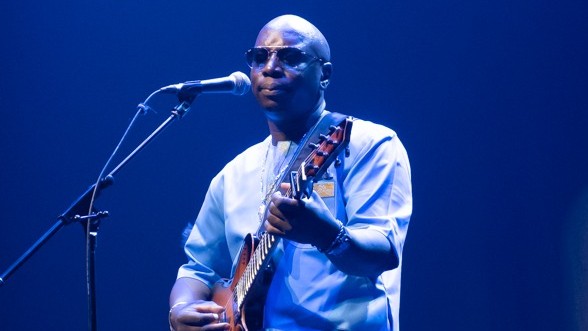AN hour into Vieux Farka Toure’s concert on Sunday, the crowd frenzy had gathered momentum, as many youngsters at AntiSocial, Lower Parel, danced in wild abandon. Leading his trio, the Malian singer-guitarist had slowly built up the mood, before reaching a hyper-energetic crescendo. Earlier, Mumbai group Many Roots Ensemble had displayed an amazing world music set. Saxophonist Jarryd Rodrigues, guitarist Subid Khan, bassist Souvik Bhattacharya and drummer Abhishek Debsikdar were joined by Anurag Naidu on keyboards and trumpet, and MC Mawali on rap vocals, as they played tunes from their releases Black Indian and Echoes Of Origins.
The show marked the first leg of the Echoes of Earth festival, which this year celebrates the seasons and their role in shaping the natural world, through its theme ‘Symphony Of Seasons’. The main festival will be held at the Embassy International Riding School in Bengaluru on December 7 and 8.
The Mumbai ‘pre-party’ was packed, though there was some confusion as the tickets said 6 pm and the music began only at 9 pm. A visual storytelling session and panel discussion had been slotted first, but the evening’s plan was communicated rather late. Even when Vieux performed, the sound was haywire for the first couple of songs, but that was sorted.
The son of legendary Malian musician Ali Farka Toure, Vieux has performed at AntiSocial earlier, besides Mumbai’s Blue Frog and Tote On The Turf. Often called the ‘Hendrix Of The Sahara’, he has a unique style blending traditional Malian music with blues elements and guitar virtuosity. One may check his live 2010 album, his 2017 release Samba or his latest record Ali, a collaboration with the American trio Khruangbin. At Sunday’s show, most people didn’t know the song titles or understand the language, but that didn’t deter anyone.
Over the years, the West African country has had a long line-up of outstanding musicians. However, it faced a major setback when music was banned in 2012 by the new authorities. Yet, many Malian musicians have been performing abroad, and releasing fresh material. The style is often rooted in the traditional tunes of the Mande people, who make up about 50 per cent of the country’s population.
The three pillars of Malian music are guitarist-singer Ali Farka Toure, vocalist Salif Keita and the late Toum. Diabate, who played the 21-stringed lute harp called kora. Farka Toure Sr, who passed away in 2006, was known to blend traditional Malian music with the blues. His best known albums are Talking Timbuktu with American guitarist Ry Cooder, Savane, From Mississippi To Mali with reggae and blues singer Corey Harris, and In The Heart Of The Moon with Diabate.
Keita made it big in Paris in the mid-1980s, but returned to Mali to record some successful albums. He combined West African styles with European and American elements. Diabate, who has played in India, was involved in many cross-cultural projects, and collaborated with American blues great Taj Mahal and banjo player Bela Fleck, among others, but Indian audiences know him best for his album with Ali Farka Toure. He passed away in July this year, Other musicians to visit India have been the group Tinariwen, who have performed at Mumbai’s Royal Opera House and AntiSocial, and Fatoumata Diawara, who had shows in Hyderabad and Delhi. The Grammy-winning group, best known for its album Aman Iman (Water Is Life), is out with its latest release Idrache (Traces Of The Past). Their style is essentially guitar-driven, using traditional melodies of the Tuareg community.
Fatoumata, along with singer Oumou Sangare, is one of the female musicians to take Malian sounds to newer regions, The YouTube recording of her 2018 concert at the Africa Festival in Wurzburg, Germany, is essential viewing. Mali has its own place in the world music map, and one may also check out singer-guitarist Rokia Traore, the groups Amadou & Miriam and Songhoy Blues, and Bassekou Kouyate, who plays the stringed instrument ngoni. The country has produced some real genius.

